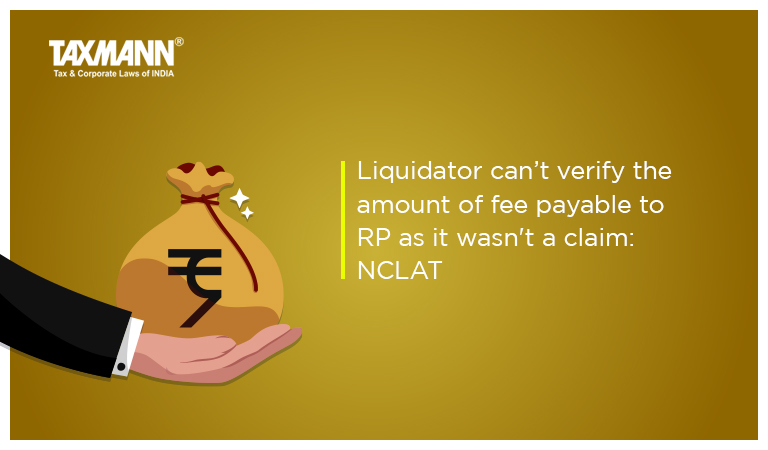Liquidator can’t verify the amount of fee payable to RP as it wasn’t a claim: NCLAT
- News|Blog|Insolvency and Bankruptcy Code|
- 2 Min Read
- By Taxmann
- |
- Last Updated on 29 September, 2022

Case Details: CA Rita Gupta v. Shilpi Cable Technologies Ltd. - [2022] 142 taxmann.com 299 (NCLAT-New Delhi)
Judiciary and Counsel Details
-
- Anant Bijay Singh, Judicial Member & Ms Shreesha Merla, Technical Member
- Sumant Batra, Adv. for the Appellant.
- Puneet Singh Bindra, Ms Simran Jeet, Ms Smiti Tewari & Sanampreet Singh, Advs. for the Respondent.
Facts of the Case
In the instant case, the appellant – Resolution Professional was discharged from the functions as RP and the NCLT directed CoC to consider and pay the fees and expenses of the appellant. In the CoC meeting, the appellant’s fee at Rs. 40 thousand per month was approved as against Rs. 10 lakhs per month claimed by the appellant.
The appellant, aggrieved by the arbitrary fixation of fee filed an application before the NCLT and the NCLT directed R1 to reconsider fees. However, no decision was taken by CoC in terms of the order of the NCLT and meanwhile, the corporate debtor went into liquidation.
Further, the Adjudicating Authority (NCLT) vide impugned order directed the appellant to file a claim before a liquidator. Thereafter, an appeal was made to the National Company Law Appellate Tribunal (NCLAT) against the order passed by the NCLT.
The appellant submitted that the fee of RP was a ‘CIRP cost’ and couldn’t be considered as a claim as defined under section 3(6) of the IBC and further submitted that the liquidator has no power to decide the fees of RP.
NCLAT Held
The NCLAT observed that Regulation 34 of the IBBI Regulations specifies that the CoC shall fix the expenses which are incurred by the RP. The word ‘expenses’ includes the fee to be paid to the RP. Thus, the fees of an RP cannot be considered to be a ‘Claim’ as defined under section 3(6) of the IBC.
The NCLAT, further observed that the liquidator can only verify and adjudicate the ‘Claims’ as defined under the IBC. Since the amount of fees payable to an RP was not a ‘claim’, the same cannot be determined or verified by the liquidator.
The NCLAT held that the Adjudicating Authority (NCLT) is empowered under the provisions of section 60(5) read with regulation 33(2) of the CIRP Regulations to fix the fees payable to the Resolution Professional. Further, the Adjudicating Authority had to decide fees in absence of a CoC and RP couldn’t be directed to prefer a ‘Claim’ before the liquidator.
In view of the above, the impugned order was to be set aside and the matter was remanded back to the Adjudicating Authority (NCLT).
List of Cases Reviewed
-
- Order of NCLT New Delhi in CA-1357(PB)/2019 in (IB) No. 64/2017, dated 22-11-2019 (para 12) reversed.
List of Cases Referred to
-
- Alok Kaushik v. Mrs. Bhuvaneshwari Ramanathan [Civil Appeal No. 4065 of 2020, dated 15-3-2021] (para 3)
- Sanjay Kumar Ruia v. Catholic Syrian Bank Ltd. [Comp. App. (AT) (Ins.) No. 560 of 2018, dated 3-1-2019] (para 4).
Disclaimer: The content/information published on the website is only for general information of the user and shall not be construed as legal advice. While the Taxmann has exercised reasonable efforts to ensure the veracity of information/content published, Taxmann shall be under no liability in any manner whatsoever for incorrect information, if any.

Taxmann Publications has a dedicated in-house Research & Editorial Team. This team consists of a team of Chartered Accountants, Company Secretaries, and Lawyers. This team works under the guidance and supervision of editor-in-chief Mr Rakesh Bhargava.
The Research and Editorial Team is responsible for developing reliable and accurate content for the readers. The team follows the six-sigma approach to achieve the benchmark of zero error in its publications and research platforms. The team ensures that the following publication guidelines are thoroughly followed while developing the content:
- The statutory material is obtained only from the authorized and reliable sources
- All the latest developments in the judicial and legislative fields are covered
- Prepare the analytical write-ups on current, controversial, and important issues to help the readers to understand the concept and its implications
- Every content published by Taxmann is complete, accurate and lucid
- All evidence-based statements are supported with proper reference to Section, Circular No., Notification No. or citations
- The golden rules of grammar, style and consistency are thoroughly followed
- Font and size that’s easy to read and remain consistent across all imprint and digital publications are applied



 CA | CS | CMA
CA | CS | CMA
